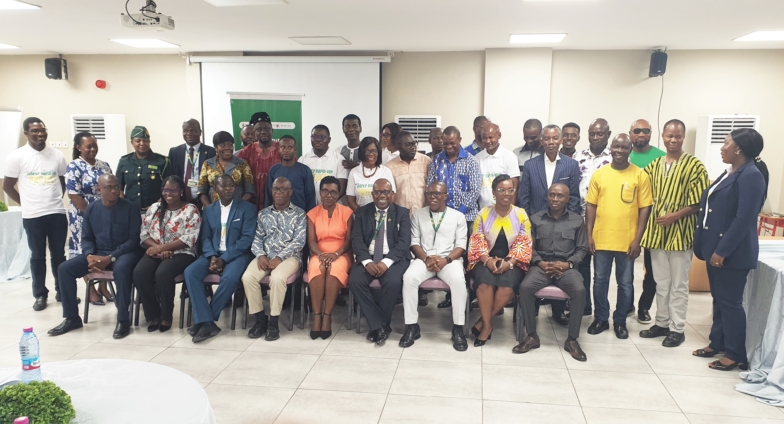The Kwame Nkrumah University of Science and Technology (KNUST) is spearheading a public health surveillance system powered by Artificial Intelligence (AI) for early detection of potential disease outbreaks in Ghana.
The Principal Investigator of the project, Dr. Kingsley Badu from the Department of Biological Sciences, observes lack of a robust surveillance system makes unknown infections thrive in vulnerable populations until a pandemic looms, thereby overwhelming Ghana's health system.
"A risk-targeted early detection surveillance system supported by Responsible AI, edge computing and climate-driven predictive models, will identify novel circulating viruses in insect vectors, humans and animals before diseases become apparent on a scale that becomes difficult to contain," he said.
He added: “The project will use the surveillance system set up by the NMEP for malaria but this time the same system with our collaboration will detect all vector-borne diseases.”
Vector-borne diseases are human illnesses caused by parasites, viruses and bacteria that are transmitted by vectors. Vectors are mostly bloodsucking insects, which take up disease-causing germs during a blood meal from an infected host (human or animal) and later transmit it to a new host after they have multiplied.
According to the WHO, vector-borne diseases account for more than 17% of all infectious diseases, causing more than 700 000 deaths annually from diseases such as malaria, dengue, schistosomiasis, human African trypanosomiasis, leishmaniasis, Chagas disease, yellow fever, Japanese encephalitis and onchocerciasis.
At an inception and stakeholder engagement workshop in Kumasi, the Director of Public Health at The Ghana Health Service and project team member, Dr Franklin Asiedu-Berkoe was worried these diseases are highest in poor tropical and subtropical areas, like Ghana.

He expressed his outfit focus on early detection in controlling pandemics.
“No matter the type of pandemic, it can be controlled even with limited resources. So this project that is based on early detection of pathogens is dear to the heart of the public health division,” he said.
The project dubbed: Responsible AI for Developing a Robust Public Health Surveillance System: Early Detection and Prediction of Vector-borne Viral Zoonotic Pathogens (AI4PEP RAPiD-VBP) seeks to improve the capacity of public health systems to detect, prepare and respond effectively to threats.
The programme manager of the National Malaria Elimination, Dr Keziah Malm also promised to work closely with the team to achieve project objectives
Pro vice-chancellor of KNUST, Prof. Ellis Owusu-Dabo pointed out the ideals of the projects are in sync with the university’s mission towards societal development.
“The four pillars of this project, that is, early detection, early warning system, early response and passive development align perfectly with our mission and vision as a university, particularly in problem-driven solutions,” he said.
This project is in collaboration with Mahidol University, Thailand and supported by the IDRC of Canada and the University of York in Canada.
Latest Stories
-
Leadership is quiet preparation, serve with integrity – Chief of Staff urges youth
9 minutes -
Mother confesses to drowning 4-year-old son in well to please lover
11 minutes -
Patricia Appiagyei rejects replacing Afenyo-Markin on ECOWAS Parliament delegation
12 minutes -
Kevin Taylor’s court appearance without arrest proof of judicial abuse under NDC – NPP MP
30 minutes -
The inconvenient truth: Why Africa’s boardrooms must reset the boardroom governance clock
1 hour -
Abuakwa South MP issues appeal for 21st-century overhaul of education system
1 hour -
PURC reports consumer grievances and monitoring efforts in Northern Region
1 hour -
Barcelona B extend Abdul Aziz Issah’s loan for 2025/2026 Season
2 hours -
Black Sabbath singer Ozzy Osbourne dies at 76, Sky News reports
2 hours -
Forestry Commission responds to Sokoban wood sellers’ harassment claims
2 hours -
Government urges legal counsels to accelerate resolution of Chieftaincy disputes
2 hours -
Education: GQAA calls for an end to punishing students for using AI
2 hours -
Unlike NPP, the NDC gov’t is taking heed of my reports on galamsey though the menace continues – Erastus Asare Donkor
2 hours -
AT CEO urges students to embrace AI at TEDxUCC Career and Skill Summit
2 hours -
Anlo Youth Council welcomes Blekusu Sea Defence Phase II but warns of looming danger on unprotected coastal stretch
3 hours

